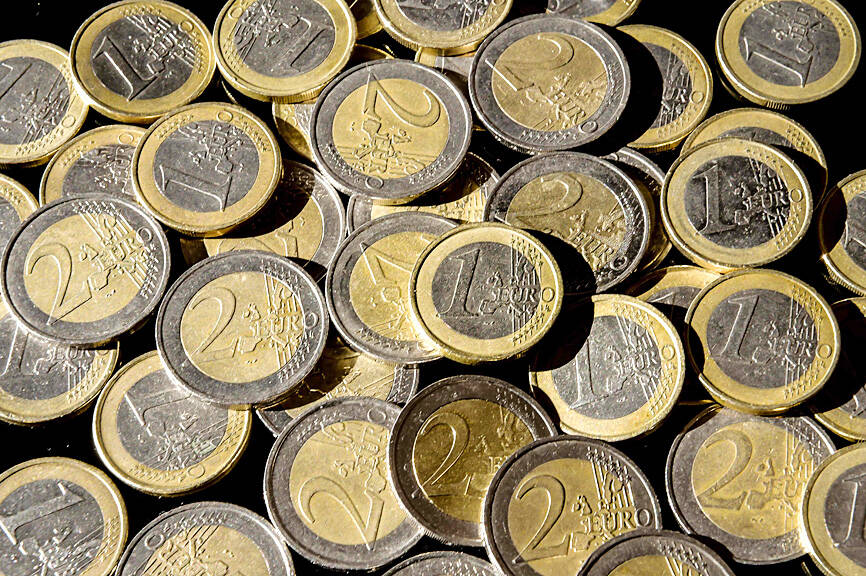The euro yesterday dropped to a fresh two-decade trough as Europe was buffeted by concerns about energy supply and economic growth, while the US dollar held firm against major peers, supported by safe-haven flows.
The euro hit US$0.9909, its lowest since late 2002, and was last down 0.29 percent at US$0.9914.
European shares yesterday extended their losses as investors waited for European Purchasing Managers’ Index data due later in the day to gauge the health of businesses in a hyperinflationary environment, while fretting about soaring energy prices and a weak economic outlook.

Photo: AFP
Russia is to halt natural gas supplies to Europe via the Nord Stream 1 pipeline for three days at the end of this month, the latest reminder of the precarious state of the continent’s energy supply.
Heat waves in the continent have already put a strain on energy supply and worries are growing that any disruption during the winter months could be devastating for business activity.
“Given the current mood, there’s obviously concerns as to whether that’s going to be three days or whether it’s going to be three years,” National Australia Bank head of FX strategy Ray Attrill said of the pipeline shutdown. “Is it really just going to be a three-day maintenance or is this just another example of weaponization of gas supply into Europe?”
Benchmark gas prices in the EU surged 13 percent overnight to a record peak, having doubled in just a month to be 14 times higher than the average of the past decade.
The British pound was similarly dragged to a new two-and-a-half-year low of US$1.1729, while the yen steadied at ¥137.270 per US dollar after touching a one-month low of ¥137.705 earlier in the day.
Elsewhere in Asia, the yuan fell to an almost two-year low of 6.8552 per US dollar. The risk-sensitive Australian dollar fell to a one-month low and last traded 0.29 percent lower at US$0.6859. The New Zealand dollar slid 0.15 percent to US$0.6163.
Against a basket of currencies, in which the euro is the most heavily weighted, the US dollar index stood firm at 109.12, attempting to breach a two-decade high of 109.29 hit last month.
Another reason investors have sought shelter in US dollars is the growing risk of a hawkish message from the US Federal Reserve’s Jackson Hole symposium, flagged by several officials last week.
“Bonds sold off, led by the front end,” Australia and New Zealand Banking Group Ltd analysts said. “That’s possibly in anticipation that Chair [Jerome] Powell’s speech on Friday is likely to reiterate hawkish messaging.”
Yields on the benchmark 10-year US Treasury note have risen about 4 basis points for the week and last stood at 3.0091 percent.
Yields on the two-year US Treasury note were up similarly up around 4 basis points at 3.3018 percent as investors remained on inflation and Fed-watch mode.

To many, Tatu City on the outskirts of Nairobi looks like a success. The first city entirely built by a private company to be operational in east Africa, with about 25,000 people living and working there, it accounts for about two-thirds of all foreign investment in Kenya. Its low-tax status has attracted more than 100 businesses including Heineken, coffee brand Dormans, and the biggest call-center and cold-chain transport firms in the region. However, to some local politicians, Tatu City has looked more like a target for extortion. A parade of governors have demanded land worth millions of dollars in exchange

An Indonesian animated movie is smashing regional box office records and could be set for wider success as it prepares to open beyond the Southeast Asian archipelago’s silver screens. Jumbo — a film based on the adventures of main character, Don, a large orphaned Indonesian boy facing bullying at school — last month became the highest-grossing Southeast Asian animated film, raking in more than US$8 million. Released at the end of March to coincide with the Eid holidays after the Islamic fasting month of Ramadan, the movie has hit 8 million ticket sales, the third-highest in Indonesian cinema history, Film

Taiwan Semiconductor Manufacturing Co’s (TSMC, 台積電) revenue jumped 48 percent last month, underscoring how electronics firms scrambled to acquire essential components before global tariffs took effect. The main chipmaker for Apple Inc and Nvidia Corp reported monthly sales of NT$349.6 billion (US$11.6 billion). That compares with the average analysts’ estimate for a 38 percent rise in second-quarter revenue. US President Donald Trump’s trade war is prompting economists to retool GDP forecasts worldwide, casting doubt over the outlook for everything from iPhone demand to computing and datacenter construction. However, TSMC — a barometer for global tech spending given its central role in the

Alchip Technologies Ltd (世芯), an application-specific integrated circuit (ASIC) designer specializing in server chips, expects revenue to decline this year due to sagging demand for 5-nanometer artificial intelligence (AI) chips from a North America-based major customer, a company executive said yesterday. That would be the first contraction in revenue for Alchip as it has been enjoying strong revenue growth over the past few years, benefiting from cloud-service providers’ moves to reduce dependence on Nvidia Corp’s expensive AI chips by building their own AI accelerator by outsourcing chip design. The 5-nanometer chip was supposed to be a new growth engine as the lifecycle